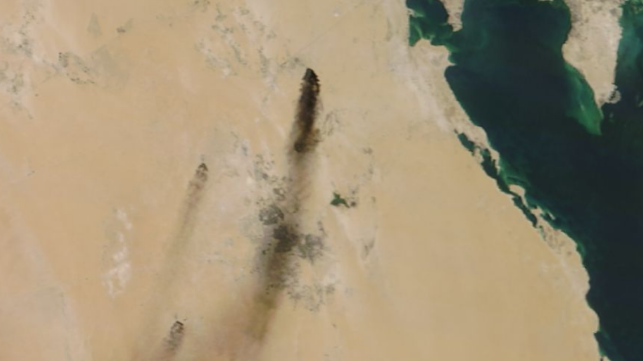 Smoke from the Abqaiq plant was visible from space on Saturday (NASA / Terra/MODIS)
Smoke from the Abqaiq plant was visible from space on Saturday (NASA / Terra/MODIS)
_x000D_
By The Lowy Interpreter 2019-09-17 20:24:54
_x000D_
_x000D_
[By Rodger Shanahan]
_x000D_
_x000D_
Last weekend’s attack on the Saudi oil facility at Abqaiq is the most dramatic escalation of the Persian Gulf tensions since the US withdrawal from the Iran nuclear deal in May 2018. At the time of writing, the weapons used have allegedly been traced to Iran, while the Yemeni Houthi movement has claimed responsibility. This latter claim has been rejected by Riyadh and Washington, which leaves the Iranian-backed Iraqi Shi’a militias (known collectively as Popular Mobilisation Units, or PMUs) or the Iranians themselves as the main suspects.
_x000D_
_x000D_
From what we know, the sophistication of the attack would indicate that it was carried out by a state or state-supported actor. The way these games of escalation and retaliation are played out in the Middle East tends to be based on a sense of equivalence. The Israeli drone attack last month against Hezbollah targets in Beirut, for instance, resulted in a limited strike against an Israeli military vehicle. The detention in July of an Iranian tanker in Gibraltar resulted in the seizure of a UK-flagged vessel in the Gulf two weeks later. Foreign Minister Javad Zarif spoke of a “prisoner swap.”
_x000D_
_x000D_
The attack against Abqaiq needs to be seen as part of the same game of equivalence, although this time it is strategic rather than tactical equivalence. Tehran sees Washington’s sanctions regime as economic warfare, and it seeks to reply in kind, imposing economic costs on its pro-US neighbors. Attacks against shipping in and outside the Gulf was one such response, and the attack against the Abqaiq facilities marks the latest.
_x000D_
_x000D_
The rationale for the attack is relatively easy to discern, but the timing is more problematic. It may have been a response to the attack against PMU targets in Iraq, and it would have had the added benefit of complicating the impending IPO of Saudi Aramco just after the Crown prince appointed a new chairman of the organization. It also comes shortly after the dismissal of the anti-Iran hawk and National Security Advisor John Bolton and ahead of the UN General Assembly meeting in New York, around which there has been talk of a Trump-Rouhani meeting, although Iran has dismissed such a possibility.
_x000D_
_x000D_
The signal that Iran has been sending has been clear: it may not be strong enough to take on Washington directly, but it is strong enough to exact a cost on the region and the Gulf Arab states in particular. But the economic significance of this attack resonates well beyond Riyadh, given Abqaiq’s importance in the global oil market.
_x000D_
_x000D_
If intelligence that can be publicly released points to an Iranian origin for these attacks, Trump will be facing one of the toughest foreign policy decisions of his presidency. The US would find it hard to justify a military response to this strike, when no US forces were targeted. His Twitter posts lend support to this reality, as they appear to have put the ball in Saudi Arabia’s court.
_x000D_
_x000D_
The problem, of course, is that with this type of targeted attack, Iran (or its proxies) has nearly, if not finally, reached the “acceptable” limit of its escalatory behaviour. Imposing a cost on its regional neighbours is one thing, but destabilizing global energy markets is another.
_x000D_
_x000D_
Dr. Rodger Shanahan is a Research Fellow at the Lowy Institute. A former Australian Army officer, he had extensive service within the Parachute Battalion Group (PBG) and has had operational service with the UN in South Lebanon and Syria, with the PBG in East Timor, in Beirut during the 2006 war, and in Afghanistan. He was the former director of the Army’s Land Warfare Studies Centre, and has also been posted to the Australian Embassies in Riyadh and Abu Dhabi. Dr Shanahan has MAs in International Relations and Middle East Studies from the ANU, and a PhD in Arab and Islamic Studies from the University of Sydney.
_x000D_
_x000D_
This editorial appears courtesy of The Lowy Interpreter and is reproduced here in abbreviated form. The original may be found at https://www.lowyinstitute.org/the-interpreter/raising-stakes-gulf-s-game-reprisals.
_x000D_
_x000D_
The opinions expressed herein are the author’s and not necessarily those of The Maritime Executive.
_x000D_
source: www.maritime-executive.com


